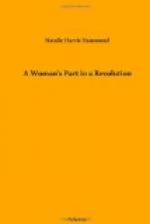The Leonard Manifesto was published December 26th, setting forth the demands of the Uitlander.
‘We want,’ it reads:
’1. The establishment of this Republic as a true Republic.
’2. A Grondwet or constitution which shall be framed by competent persons selected by representatives of the whole people, and framed on lines laid down by them; a constitution which shall be safeguarded against hasty alteration.
’3. An equitable Franchise law and fair representation.
’4. Equality of the Dutch and English languages.
’5. Responsibility
to the Legislature of the heads of the
great departments.
’6. Removal of religious disabilities.
’7. Independence
of the Courts of Justice, with adequate and
secured remuneration
of the judges.
’8. Liberal and comprehensive education.
’9. An efficient
Civil Service, with adequate provision for
pay and pension.
‘10. Free Trade in South African products.’
It was further planned to hold another meeting of the ’National Union,’ and afterward make a last demand upon the Government to redress our wrongs.
Arrangement meanwhile was made with Dr. Jameson, who was encamped on the western border of the Republic with a body of the Chartered Company’s troops. In case of a disturbance he was to come to the aid of Johannesburg with at least a thousand men and 1,500 guns. It was also distinctly understood between him and the five gentlemen who were the recognised leaders of the movement, that he should not start until he had received instructions to do so directly from them.
I gathered my household about me, explained the situation, and gave the servants their choice, whether they would go into town or remain in the house. The four white servants decided to remain, but the native boys begged leave to depart under various pretexts. One to get his missis from Pretoria because he was afraid the Boers might kill her. Another to tell his mother in Natal that he was all right. Another frankly said, that as the white men were going to fight among themselves, this was no place for Kaffirs.
I arranged to leave Mr. Hammond’s secretary in charge of the house. We hastily packed up a few of our most precious belongings, and left, to take possession of four tiny rooms at the hotel in town. With a full heart I looked back at my pretty home. The afternoon shadows were beginning to lengthen; I saw the broad verandah, the long easy chairs suggestive of rest; my books on the sill of the low bedroom window; the quiet flower garden, sweet with old-fashioned posies associated with peace and thrift. We were going to—what?
II
My diary carries the story on:—
December 30.—We find the town intensely excited, but there is no disorder. Men are hurrying about in cabs and on foot with determined-looking faces, but no other visible evidence of the day’s tragedy.




